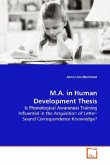Earth produces a dipole static magnetic field that is sufficiently stable to allow for derivation of directional information in a variety of species. This ability, known as magnetoreception, has been studied primarily in birds and reptiles, but some research has suggested that the ability exists in mammals. Platt describes three experiments in which participants were exposed to static magnetic field anomalies in a variety of contexts including both natural and laboratory settings. While results were mixed, an ability to discriminate between the presence and absence of a magnetic field anomaly appears to be acquirable over time. Platt discusses theoretical implications of the findings, methodological difficulties related to studying magnetoreception and suggestions for further research.







